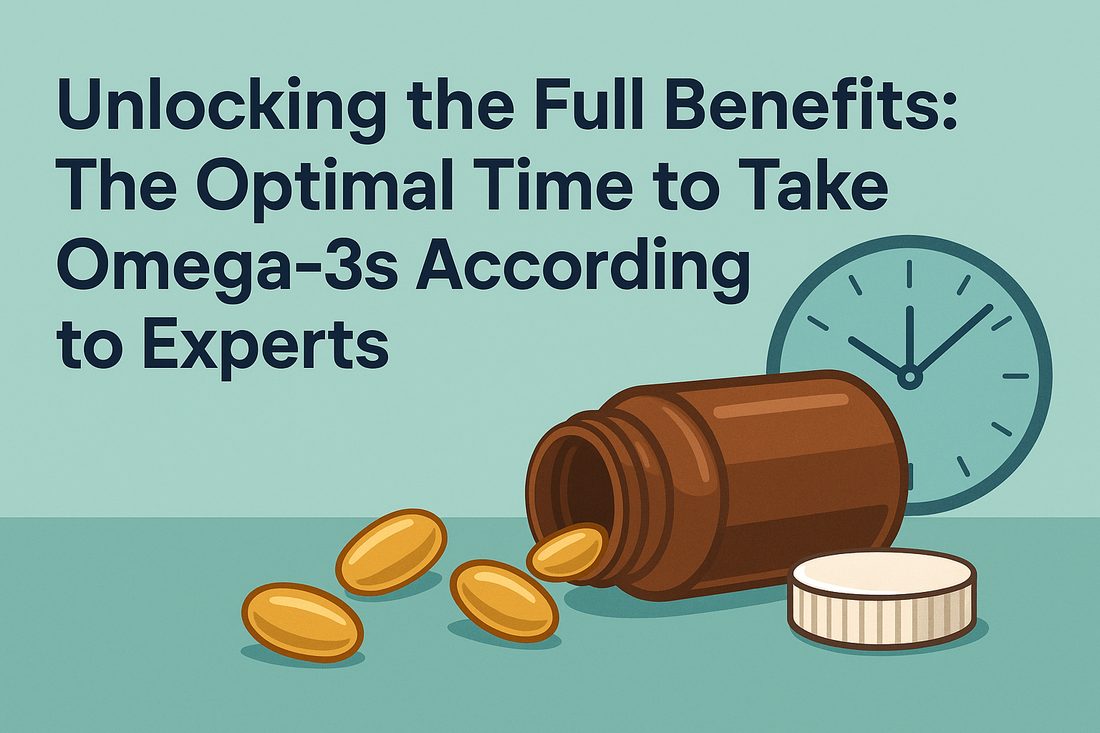
Share
So, you finally made the smart decision—you bought a high-quality Omega-3 fish oil from Optimal Health Bridge. Yay, go you! You’re now ready to support your heart, brain, joints, and all the amazing cells in your body.
But now comes the big question: when should you take it?
Morning? Evening? During a full moon with gluten-free toast?
Don't worry—we’re here to help! In this article, we’ll explore what science and experts say about the best time to take Omega-3s, and how to make the most of your daily dose.
What Are Omega-3 Fatty Acids?
Omega-3s are like rockstars in the supplement world. They’re super helpful, really important, and your body needs them—but doesn’t make them on its own. That means you need to get them from food or supplements.
There are three main types of Omega-3s:
- ALA (Alpha-linolenic acid): Found mostly in plant foods like flaxseeds and chia seeds.
- EPA (Eicosapentaenoic acid): Found in fish and known for fighting inflammation and supporting heart health.
- DHA (Docosahexaenoic acid): Great for your brain and eyes—it helps with clear thinking and good vision.
Natural Sources of Omega-3s:
- Salmon, sardines, and mackerel
- Walnuts
- Flaxseeds and chia seeds
- Algae oil (great for vegans!)
- Omega-3 enriched eggs
Most people don’t get enough EPA and DHA from their food, which is why taking a supplement can really help.
10 Health Benefits of Omega-3s
Omega-3s support your body in many ways. Here are ten awesome benefits:
- Helps your heart stay strong by lowering fats in your blood
- Supports brain health and memory as you age
- Reduces joint pain and swelling
- Protects your eyes and may help prevent vision problems
- Keeps your skin and hair healthy
- Can lift your mood and help with anxiety
- Supports healthy pregnancy and baby brain development
- Boosts the immune system so you stay healthier
- Helps manage blood sugar and metabolism
- May help you age in a healthier way
Bottom line: Omega-3s are really good for your body.
What Affects How Your Body Absorbs Omega-3s?
Even the best Omega-3 supplement won’t work if your body can’t absorb it well. Here are some things that affect absorption:
- Needs fat to work: Omega-3s are fat-soluble, so always take them with food that contains fat.
- Supplement form: Look for Omega-3s in triglyceride form—they're easier for your body to absorb.
- Meal type: A balanced meal with protein, fat, and fiber helps absorption.
- Gut health: Digestive issues like IBS can make it harder to absorb fat-based nutrients.
- Quality: Cheap fish oil can be old or damaged and won’t work as well.
- Digestive enzymes: If your body lacks enzymes, it may not break down the supplement properly.
- Smoking and alcohol: These can block absorption and cause more inflammation.
- Routine: Taking your Omega-3 at the same time each day helps your body use it better.
- Enteric coating: Helps prevent fishy burps by releasing the oil in your intestines instead of your stomach.
- Exercise: Regular movement helps your body use Omega-3s more effectively.
When Is the Best Time to Take Omega-3s?
The short answer? The best time is whenever you’ll remember to take it—just make sure you take it with a meal that contains fat.
Morning:
- Perfect with breakfast that includes healthy fats, like avocado or eggs.
- Easy to remember if it becomes part of your morning routine.
Afternoon:
- Take it with lunch that has a mix of carbs and healthy fats.
- Can help keep your energy and focus up during the day.
Evening:
- Some people say it helps them feel calm before bed.
- May improve sleep and reduce nighttime stress.
Before or After Workout:
- If taken with your post-workout meal, Omega-3s may help muscles recover and reduce soreness.
Split Doses:
- Taking smaller doses twice a day (morning and evening) can improve absorption and lessen side effects like burps.
Goal-Based Timing:
| Goal | Best Time |
|---|---|
| Boost energy and focus | Morning or midday |
| Improve sleep | Evening or before bed |
| Help reduce inflammation | Take daily at a set time |
| Support mood and lower stress | Evening or during stressful times |
| Assist in pregnancy | Split morning and evening (ask your doctor) |
10 Best Tips for Taking Omega-3s
Here are easy ways to get the most out of your Omega-3 supplement:
- Take it with a meal that has healthy fat.
- Don’t take it on an empty stomach.
- Split higher doses between two meals if needed.
- Be consistent—take it at the same time daily.
- Choose a high-quality product with proper EPA/DHA levels.
- Pick a triglyceride form for better absorption.
- Combine with vitamin D for extra health support.
- Don’t take at the same time as fiber supplements—they can block absorption.
- Refrigerate oils to keep them fresh—no one wants smelly fish oil!
- Track how you feel over time to notice improvements in energy, mood, or digestion.
Bonus tip: If fish burps bug you, try lemon-flavored or enteric-coated capsules!
Myth: Fish Burps Mean It’s Working
Nope, that’s not true. Fish burps usually mean your supplement may be going bad or your body isn’t digesting it well.
Try these tips if that happens:
- Always take with food
- Store your supplement in a cool, dry place
- Switch to a better-quality product
- Look for flavor-coated or enteric-coated capsules
- Drink more water during the day
You don’t need to live with smelly burps to get healthy.
So, When Should YOU Take It?
Here’s the easy answer: take your Omega-3 when it works best for your schedule—just make sure it’s with food that contains fat.
If you want to:
- Have more energy: Take it in the morning
- Feel calmer and help sleep: Try evening
- Support general wellness: Anytime with food is fine










